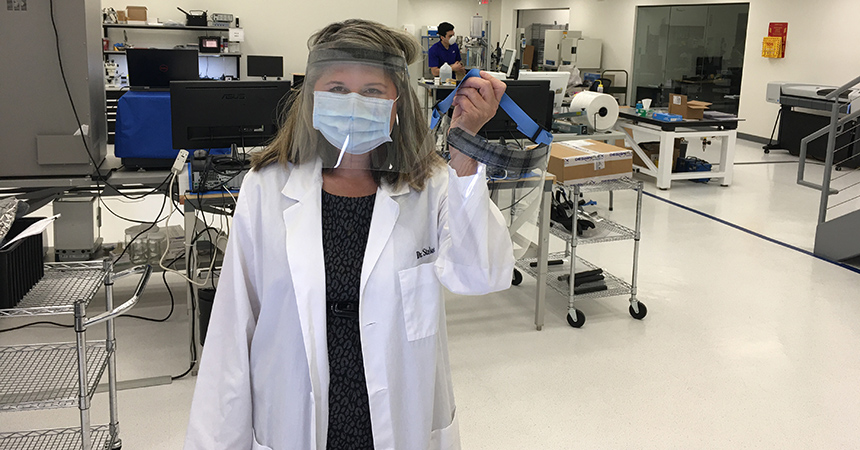TCOM alumni launches company to address need for masks
By Jan Jarvis
When the pandemic struck, the demand for personal protective equipment for healthcare workers hit the nation hard.
But Dr. Steffini Stalos, a 2004 Texas College of Osteopathic graduate, saw a need beyond the masks used by healthcare professionals in hospitals.
“I saw problems in labs,” she said. “Even if coronavirus testing were available at every corner, I was worried about a bottleneck developing because of a shortage of masks in the lab.”
As a pathologist who consults with medical laboratories, Dr. Stalos knew that lab personnel had to be able to take the necessary precautions to test specimens. Test results are important because 60 percent to 70 percent of medical management decisions are determined by them, Dr. Stalos said. Knowing the need was great, she set out to meet it.
The result is Core Medical Industries LLC, a Dallas-based manufacturing company that Dr. Stalos launched in the spring to bring medical devices to market. While her immediate goal was to get masks into Texas labs, she soon determined that the need for N95 masks went far beyond that.
“Even when going at top speed, only 3 percent of the world’s need for N95 masks is being met by current manufacturing production,” she said. “What is being produced is going mostly to hospitals, but we have a need in labs and other places.”
Outside of hospitals, urgent care centers, acute care centers, pain and rehabilitation centers, primary care clinics, endoscopy centers, first responders, ambulatory surgery clinics, and clinical laboratories all use the masks.
Unlike homemade cloth masks, which only filter out 2 to 38 percent of particles, N95 masks used in medical settings, must filter out 95 percent or more of the smallest particles.
Dr. Stalos’ goal will be to produce a high filtration mask and other enhanced masks.
For now, the masks are staying within Texas. But as the company grows, the rest will be on reserve for other states and the federal government, she said.
Building a company that produces this type of high-quality mask has not been easy, but Dr. Stalos said she is up to the challenge.
“There’s a huge learning curve,” she said. “But this is may be an once-in-a-lifetime opportunity to deal with this kind of thing. The worst thing that could happen is to lose this lesson and learning that can be applied to the future.”
Dr. Stalos believes the need for personal protection equipment will not end with the current pandemic.
The Spanish Influenza of 1918 came in several waves with the second being especially brutal, she said. There is also evidence that the time span between pandemics is getting shorter.
“Based on what we know, it’s just a matter of time and that has strongly motivated me,” she said. “I worry not only about this pandemic, but the more lethal organisms that lurk in the future.
“We need to prepare for our future to minimize health and economic impact.”




![Uyen Sa Nguyen Scaled[58]](https://www.unthsc.edu/newsroom/wp-content/uploads/sites/16/Uyen-Sa-Nguyen-scaled58-145x175.jpg)

Social media